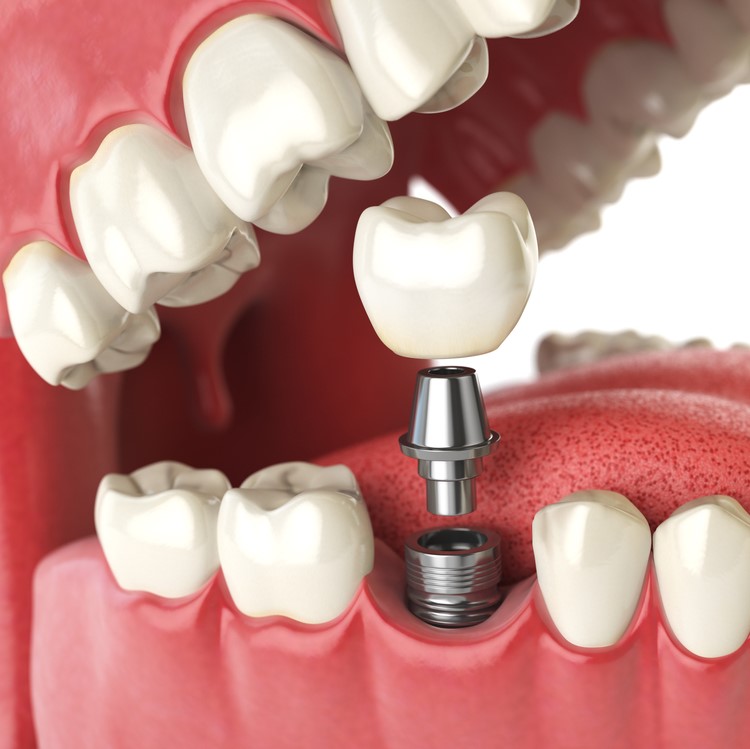Do you have one or more missing teeth that are having an impact on your smile and dental health? If so, a dental bridge might be something to think about. A common restorative choice, dental bridges can help you replace lost teeth and improve the function and appearance of your smile. We will discuss what a dental bridge is, how it functions, and the advantages it can provide in this article. Read on to discover more about dental bridges whether your goal is to restore your confidence or to improve your oral health.
Procedure Time
2 - 3 Weeks
Downtime
1 - 2 Weeks
Back to Work
Negligible
Results
3 - 4 Weeks
What is a Dental Bridge?
A dental bridge is a dental treatment that helps replace missing teeth. Think of it like a bridge connecting two sides of a river. In this case, the “river” is the gap created by the lost tooth or teeth, and the “bridge” is the dental restoration.
The bridge is made up of artificial teeth called “pontics,” which fill the gap and are supported by the natural teeth or dental implants on either side. These supporting teeth are often covered with dental crowns to strengthen them and hold the bridge in place.
Who needs a Dental Bridge?
When one or more teeth are missing, a dental bridge may be suggested. Many factors, such as dental decay, gum disease, trauma, or congenital flaws, might contribute to this.
A range of problems, including difficulties speaking, chewing, and even smiling, can result from missing teeth. Also, they may cause the remaining teeth to move and go out of alignment, which may result in other dental issues. Also, missing teeth can alter a person’s confidence and the way their face looks overall.
If you are dealing with any of these problems, a dental bridge can be an excellent solution for you. To choose the best course of action for your particular needs, it is crucial to speak with your dentist. Your dentist may evaluate your dental health, talk with you about your preferences and goals, and create a treatment plan just for you to help you get back your smile and oral function.
Before After Results


Types of Dental Bridges
Dental bridges come in a variety of varieties, each one created to satisfy particular requirements and tastes. The most typical kinds of dental bridges are:
Traditional bridges
These bridges are made of one or more pontics, or false teeth, which are secured in place by dental crowns fastened to the teeth on each side of the gap, or abutment teeth.
Cantilever bridges
Cantilever bridges, like conventional bridges, support the pontic with a dental crown. They are only secured on one side of the gap, as opposed to being anchored on both sides.
Maryland bridges
The pontic of these bridges is suspended in the space between two neighboring teeth, and a metal or porcelain framework is attached to the backs of the teeth on each side
Implant supported bridges
Dental implants, which are inserted surgically into the jawbone, are used to hold these bridges in place. Those who have several missing teeth in a row or who are not suitable candidates for regular bridges are often advised to get this kind of bridge.
Based on aspects like the location and extent of your missing teeth, your general oral health, and your budget, your dentist can assist you in choosing the type of dental bridge that is most appropriate for your particular circumstances.
What does a dental bridge look like?
A prosthetic tooth or teeth (pontics) affixed to dental crowns on either side of the space where the missing teeth are generally positioned make up a dental bridge. The teeth next to the gap are given dental crowns, which act as the bridge’s anchors.
For a seamless appearance, the pontics on a dental bridge are typically composed of porcelain or ceramic, which can be matched to the color of your natural teeth. Although they could also be made of other materials like gold or metal alloys, dental crowns that support bridges are commonly composed of porcelain or ceramic.
The placement of the lost teeth and the unique requirements of the patient will determine the design and size of a dental bridge. Dental bridges can offer a natural-looking and aesthetically acceptable solution for replacing lost teeth since they are often made to resemble and function like real teeth.

What is the procedure of getting dental bridges?
A dental bridge is normally obtained using the following steps:
- Consultation and examination: Schedule a consultation and examination with a dentist as the initial step. If a dental bridge is the appropriate course of therapy for you, the dentist will assess your teeth and gums.
- Teeth Preparation: If a dental bridge is advised, the teeth on each side of the space where the lost tooth or teeth are located must first be prepared. These teeth will be prepared to receive dental crowns that will serve as the bridge’s supports.
- Impressions of teeth: An impression of your teeth and gums will be taken by the dentist once your teeth have been prepped in order to make a mold for the dental bridge. The bridge will be built specifically for your mouth using this mold in a dental laboratory.
- Temporary Bridge: The dentist will place a temporary bridge in your mouth to preserve the cleaned-out teeth and gums while the permanent bridge is being built.
- Fitting of the Bridge: The dentist will take out the temporary bridge and fit the permanent bridge into place once the permanent bridge is ready. The bridge will be altered to guarantee a secure fit and ideal bite.
Follow-Up Appointments: The dentist will arrange follow-up appointments to evaluate the fit of the bridge and make any required modifications.
A dental bridge must be built specifically to fit your mouth, so the entire process can take several weeks. Nevertheless, the finished product replaces missing teeth in a natural-looking and practical manner.
Benefits of dental bridges
Dental bridges have a number of advantages, such as:
- Enhanced appearance: By filling up gaps left by missing teeth, dental bridges can enhance the look of your smile. They are designed specifically to match the size, color, and form of your natural teeth, which can produce a beautiful and natural-looking smile.
- Restored function: By supporting the neighboring teeth and preventing them from slipping out of position, dental bridges can assist restore correct chewing and speaking functions.
- Preservation of neighboring teeth: When a tooth is gone, the teeth that are close by may move, which could lead to a bad bite and other dental problems. By supporting nearby teeth and maintaining their alignment, dental bridges can aid in preventing this.
- Durability: Dental bridges can offer a long-lasting solution for restoring missing teeth since they are made of tough, long-lasting materials like porcelain and ceramic crown.
- Convenience: Unlike dentures, dental bridges do not need to be taken out or maintained specifically, making them a practical alternative for replacing missing teeth.
- Cost-effective: As compared to alternative solutions, such dental implants, dental bridges are a more affordable option for replacing missing teeth.
For people who have missing teeth, dental bridges can offer a variety of advantages, including better appearance, restored function, preservation of neighboring teeth, durability, convenience, and cost effectiveness.
Side effects of dental bridges
Although dental bridges are typically a safe and effective treatment option for restoring lost teeth, patients should be informed of some potential negative effects. They may consist of:
- Sensitivity: After receiving a dental bridge, some individuals may become sensitive to hot or cold conditions. Once the teeth get used to the bridge, this sensitivity typically goes away after a couple of weeks.
- Discomfort: Patients may feel some pain or discomfort in the area where the dental bridge was positioned. Usually only mildly uncomfortable, this discomfort is treatable with over-the-counter painkillers.
- Deterioration: Tooth decay may develop beneath a dental bridge if it is not properly maintained. For the purpose of stopping decay, it is crucial to brush, floss, and get regular dental exams.
- Gum disease: Around the dental bridge, poor oral hygiene can potentially cause gum disease. Gum disease symptoms include red, swollen, and bleeding gums.
- Bridge failure: A dental bridge may occasionally fall apart owing to poor positioning or other issues. As a result, the bridge may require extra dental work to be fixed or replaced.
Overall, most individuals who receive a dental bridge report little negative effects. To reduce the risk of issues, it is crucial to maintain good oral hygiene habits and get frequent dental checkups.
How does a dental bridge work?
The gap created by lost teeth is filled up by a dental bridge. One or more prosthetic teeth (pontics) are mounted to dental crowns on either side of the gap in this type of dental prosthesis.
The teeth next to the gap are given dental crowns, which act as the bridge’s anchors. A bridge that replaces missing teeth can look natural and be visually pleasing since the pontics are manufactured specifically to match the color and contour of your natural teeth.
By supporting the neighboring teeth and preventing them from slipping out of position once the dental bridge is in place, it can aid in restoring correct chewing and speaking capabilities. Also, the bridge can more uniformly transfer the pressures of your bite across your teeth, which can lower your chance of developing dental issues like tooth decay and gum disease.
Overall, replacing missing teeth with a dental bridge can be a durable and practical way to improve your smile’s beauty and function. The health and lifespan of your dental bridge depend on regular brushing, flossing, and dental exams.
What is the cost of dental bridges in Riyadh?
Dental bridges in Riyadh might cost more or less depending on the type of bridge, the materials used, the difficulty of the treatment, the dentist’s experience, and other variables. Dental bridge prices in Riyadh typically range from SAR 1,500 to SAR 6,000 per tooth.
Dental Bridges
Starting FromDental Bridges
StandardWhy choose us?
Best dentist in Riyadh
Cheap dental clinic in Riyadh
The Enfield Royal Saudia dental clinic in Riyadh is not only the greatest, but also the most affordable. with respect to other clinics. You can receive treatment on a budget because of the adaptability and affordability of our prices.
FAQs.
The process of getting a dental bridge should not hurt. The area around the teeth that will support the bridge will be numbed by local anesthetic used by the dentist during the process. This can lessen any discomfort or pain experienced while having the treatment. It is typical to feel some discomfort or soreness in the region where the dental bridge was positioned after the treatment. Ibuprofen or acetaminophen, two over-the-counter pain medications, can be used to address this discomfort, which is often modest.
After receiving a dental bridge, individuals may occasionally feel sensitivity to hot or cold temperatures for a few weeks. When the teeth get used to the bridge, this sensitivity typically decreases.
The position of the missing teeth, the health of the neighboring teeth, and the patient’s dental state all affect how many teeth can be in a dental bridge.
The condition of the teeth next to the gap will determine the maximum number of teeth that can be in a dental bridge. The teeth that will support the bridge must be sturdy and healthy, and there must be enough healthy tooth structure to support the crowns that will hold the bridge in place.
Relevant Treatments.

Dental Implants
People also believe that a new tooth will naturally sprout once a tooth is lost. Unfortunately, permanent teeth can no longer develop. However, there are several dental procedures that can replace your missing....

Root Canal
Are you tired of suffering from persistent tooth pain that just won’t go away? It can be frustrating and downright miserable, especially when it interferes with your daily life. We understand how frustrating and uncomfortable this can...





